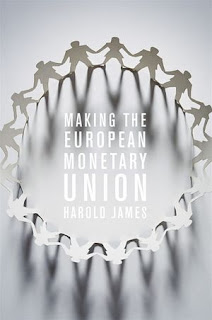 The Creation and Destruction of Value: The Globalization Cycle and Krupp: A History of the Legendary German Firm.
The Creation and Destruction of Value: The Globalization Cycle and Krupp: A History of the Legendary German Firm.He applied the “Page 99 Test” to his new book, Making the European Monetary Union, and reported the following:
I was initially quite skeptical when I learned of the Page 99 Test, and wondered whether my page 99 was filled with peripheral technical details about the arcanae of monetary integration. But in fact, p. 99 is indeed a kind of microcosm of the book. It deals with two themes: the European response to the global monetary uncertainty that followed the closing of the gold window by President Nixon in August 1971; and the institutional maneuvering through which central bankers and the Basel-based Bank for International Settlements wanted to place themselves at the center of the European response. The BIS suggested that it should build up a permanent secretariat around the committee of European central bank governors that had been meeting in Basel.Learn more about Making the European Monetary Union at the Harvard University Press website.
Overall, the book tells the story of European monetary integration from the 1960s to the 1990s as a story of a European response to global monetary and financial turbulence. Some people believe that the Euro was driven by a fundamentally political logic (to make war in Europe impossible), and that the economic side was not well thought out: I lay out the basis for the economic and monetary thinking (and the way in which the technical experts guided and shaped that thinking) that drove the creation of the Euro.
Obviously, there are also themes that do not appear on this one page. A big obstacle to clear analysis of the Euro and its problems today lies in a propensity to develop myths about the origins of the single European currency. In one very powerful view the currency union was a high-minded European political project that ignored economic realities. It was needed to stop the recurrence of war between France and Germany. Both proponents of the Euro project such as the veteran German Foreign Minister Hans-Dietrich Genscher but also by opponents such as the economist Martin Feldstein have touted this theory. But it is implausible. Americans are perfectly aware that they haven’t had a war with Canada or Mexico recently (although in the long past there were indeed such conflicts), and that they don’t need a currency union to improve relations with neighbors.
The book shows how a political consensus alone was never enough, and how political initiatives only succeeded when they were underlined by a solid economic logic.
--Marshal Zeringue



